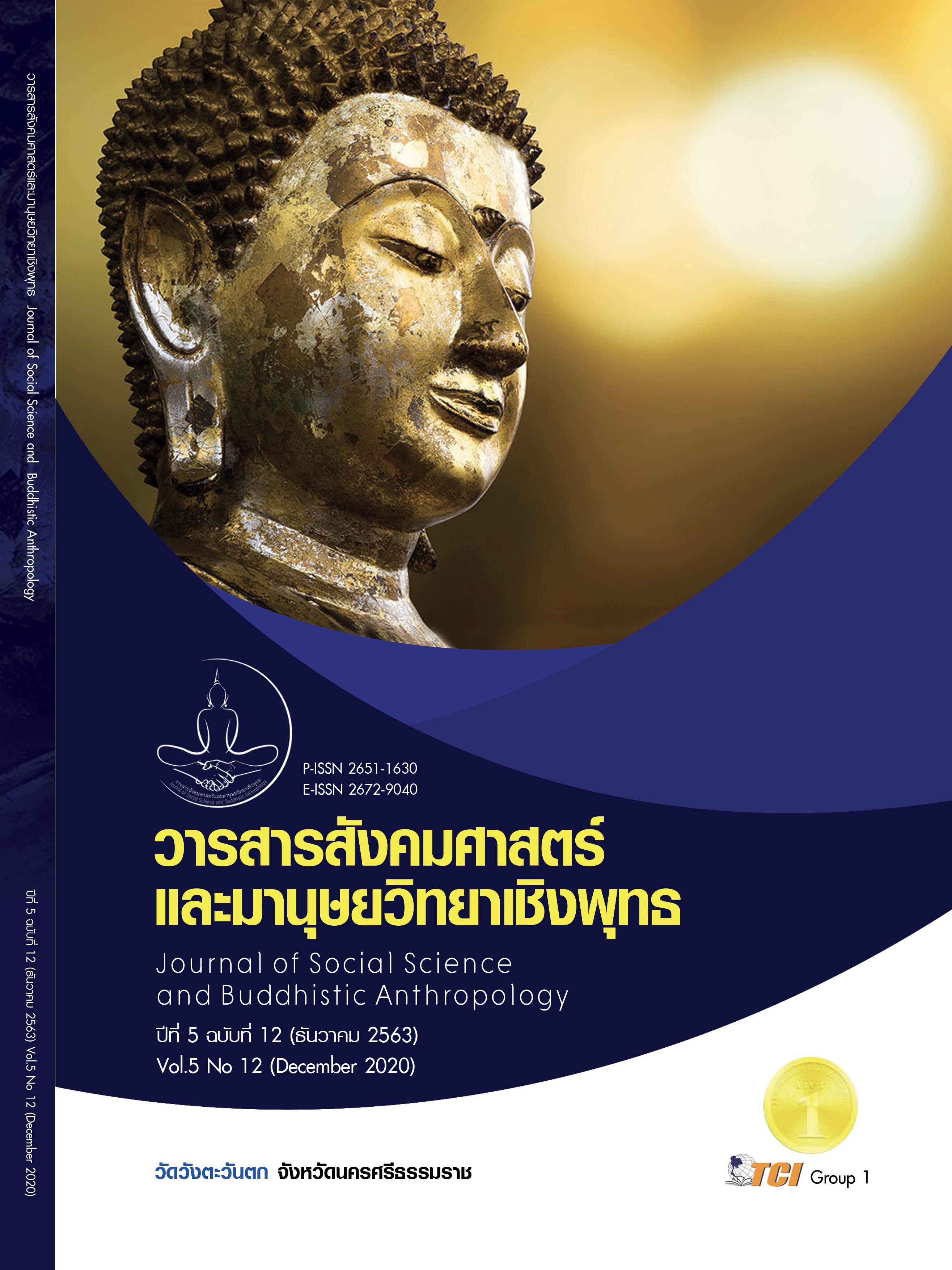DEVELOPING PROFESSIONAL ETHICS OF THE GRADUATE DIPLOMA IN TEACHING PROFESSION STUDENTS WITH THE GROUP INVESTIGATION MODEL IN THE COURSE OF DEVELOPMENT OF SELF ACTUALIZATION FOR TEACHER
Keywords:
Developing Professional Ethics, Graduate Diploma in Teacher Education, Model of teaching group searching, Teacher developmentAbstract
The objective of this research article to: 1) the efficiency of learning activities by using the Group Investigation Model for the professional ethics development of Graduate Diploma Students in Teaching Profession, 2) compare the professional ethics level of Graduate Diploma Students in Teaching Profession between student group who received learning activities by Group Investigation Model and student group who received learning activities by Traditional Model, and 3) compare the moral reasoning level of Graduate Diploma Students in Teaching Profession between student group who received learning activities by Group Investigation Model and student group who received learning activities by Traditional Model. The research design was quantitative research. The sample group used in this research is 56 Graduate Diploma students in Teaching Profession who study Self Actualization for Teacher course in semester 2, academic year 2018 which were obtained by simple random sampling method. The instruments used in the research were: 1) The learning activity management plan by using the Group Investigation Model and learning activities management plan by Traditional Model 2) Professional ethics assessment test, and 3) Moral reasoning test. Data were analyzed using the efficiency test of teaching activities E1 / E2, averages, standard deviation, and t - test. The results of the research showed that: 1) the efficiency of learning activities by using the Group Investigation Model found the efficiency value 93.40 / 88.27, 2) Professional ethics level of the Graduate Diploma Students in Teaching Profession students who received learning activities by using the Group Investigation Model higher than students group who received learning activities by Traditional Model with statistical significance at the level of .05, 3) The moral reasoning level of students who received learning activities by using the Group Investigation Model higher than student group who received learning activities by Traditional Model with statistical significance at the level of .05.
References
กระแส มิฆะเนตร. (2546). ผลการสอนโดยวิธีสืบเสาะหาความรู้เป็นกลุ่มที่มีต่อผลสัมฤทธิ์ทางการเรียนและความสามารถในการคิดวิเคราะห์ของนักเรียนชั้นประถมศึกษาปีที่ 4 โรงเรียนลําดวน จังหวัดสุรินทร์. ใน วิทยานิพนธ์การศึกษามหาบัณฑิต สาขาศึกษาศาสตร. มหาวิทยาลัยสุโขทัยธรรมาธิราช.
ข้อบังคับคุรุสภาว่าด้วยจรรยาบรรณวิชาชีพ พ.ศ. 2556. (2556). ราชกิจจานุเบกษา เล่ม 130 ตอนพิเศษ 130 ง หน้า 72.
ข้อบังคับคุรุสภาว่าด้วยมาตรฐานวิชาชีพ (ฉบับที่ 4) พ.ศ. 2562. (2562). ราชกิจจานุเบกษา เล่ม 136 ตอนพิเศษ 68 ง หน้า 18.
ดวงเดือน พินสุวรรณ์. (2561). “ปัญหาคุณธรรมจริยธรรมของครู” . ใน เอกสารการสอนวิชาคุณธรรมจริยธรรม ของครู หน่วยที่ 14 คุณธรรมจริยธรรมสำหรับครู. มหาวิทยาลัยสุโขทัยธรรมาธิราช.
นิคม สิงห์ทอง. (2552). การพัฒนาการเรียนรู้โดยใช้ชุดการจัดการเรียนรู้เรื่องวัฒนธรรมภูมิปัญญา ของไทยและนานาประเทศ ประกอบกิจกรรมการเรียนร่วมมือเทคนิคกลุ่มสืบค้น กลุ่มสาระการ เรียนรู้สังคมศึกษา ศาสนาและวัฒนธรรม มัธยมศึกษาปีที่ 6. ใน รายงานการวิจัย. โรงเรียนท่าคนโทวิทยาคาร.
นิตยา ชังคมานนท์. (2554). การเรียนแบบร่วมมือโดยใช้เทคนิคจีไอที่มีต่อผลสัมฤทธิ์ทางการเรียนและทักษะการทํางานร่วมกัน ในรายวิชา ส.503 สังคมศึกษา ของนักเรียนชั้นมัธยมศึกษาปีที่ 5 โรงเรียนสิรินธรราชวิทยาลัยจังหวัดนครปฐม. ใน วิทยานิพนธ์การศึกษามหาบัณฑิต สาขาศึกษาศาสตร. มหาวิทยาลัยสุโขทัยธรรมาธิราช.
สมจิต ขันธุปัทม์. (2553). ผลการจัดการเรียนรู้สาระภูมิศาสตร์เรื่อง แผนที่ ชั้นมัธยมศึกษาปีที่ 1 กลุ่มสาระการเรียนรู้สังคมศึกษา ศาสนาและวัฒนธรรมโดยใช้กิจกรรมกลุ่มร่วมมือ เทคนิค GI. ใน วิทยานิพนธ์การศึกษามหาบัณฑิต สาขาศึกษาศาสตร. มหาวิทยาลัยมหาสารคาม.
สำนักวิชาการ. (2559). สำนักงานเลขาธิการสภาผู้แทนราษฎร “ปัญหาครู: ปัญหาที่รอการปฏิรูป” . กรุงเทพมหานคร: สำนักงานเลขาธิการสภาผู้แทนราษฎร.
สำนักส่งเสริมวิชาการและงานทะเบียน. (2561). ผลการเรียนรายวิชา 02143601 การพัฒนาความเป็นครู. ใน วิทยานิพนธ์ครุศาสตรมหาบัณฑิต สาขาอุตสาหกรรม. มหาวิทยาลัยเทคโนโลยีราชมงคลธัญบุรี.
สุวรรณมาลี นาคเสน. (2554). การพัฒนาชุดการเรียนคณิตศาสตร์โดยใช้รูปแบบการสอน Group Investigation เรื่องวงกลม ชั้นมัธยมศึกษาปีที่ 3. ใน วิทยานิพนธ์การศึกษามหาบัณฑิต สาขาศึกษาศาสตร. มหาวิทยาลัยศรีนครินทรวิโรฒ.
หลักสูตรประกาศนียบัตรบัณฑิต สาขาวิชาชีพครู. (2561). เอกสารการสอนรายวิชาการพัฒนาความเป็นครู หลักสูตรประกาศนียบัตรบัณฑิตสาขาวิชาชีพครู. กรุงเทพมหานคร: มหาวิทยาลัยเทคโนโลยีราชมงคลธัญบุรี.
Ivy Geok-Chin Tan and Others. (2005). Students’ Perceptions of Learning Geography through Group Investigation in Singapore. International Research in Geographical and Environmental Education, 14 (4), 261-276.
Sharan, S. & Others. (2013). The Group Investigation approach to cooperative learning International Handbook of Collaborative Learning. New York: Routledge.
Slavin, R. E. (2010). Instruction based on cooperative learning, In R Handbook of Research on Learning and Instruction. London: Taylor and Francis.
Tan, I.G.C. (2004). Effect of cooperative learning with group investigation on secondary students achievement, motivation, and perceptions. Retrieved June 2020, 10, from from.http://www.acis.nie.edu.sg/nieacis/libris/ sources/ereaources/doctopatethesis_detail.do?selectIndex=t&callNo= lb1032%20Tan&auther%20Ivy%20Geok%20 Chin.
Tiong, H.B. and Aun, T.K. (2004). Using Group Investigation (GI) to Develop in Service teacher’ Pedagogical Content Knowledge. เรียกใช้เมื่อ 2020 June 10 จาก from http://72.14.203.104/search?q=oYuUjT7RcgJ: www.iasce. net/Conferen ce2004/23June/Boontiong/IASCE%25202004 %2520Con% 2520Full%2520Paper.doc +sharan+Group+Investigation +thesis&hl=th.









